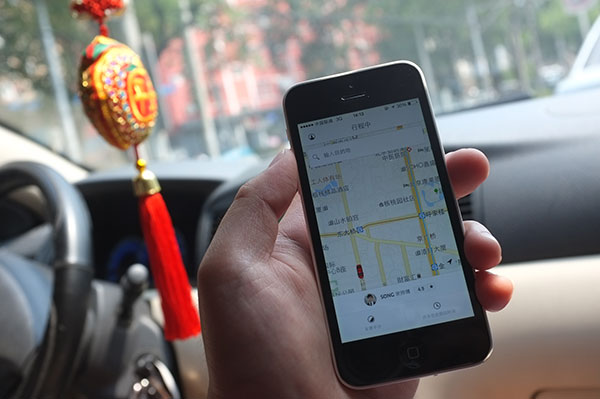 |
|
A passenger uses the Uber Technologies Inc app in Beijing. Earlier this month, several media reports said that phantom trips account for 30 to 40 percent of Uber's 1 million daily bookings in China. Uber's spokeswoman claimed according to the company's detection system, fraud cases accounted for about 3 percent.[Photo provided to China Daily] |
Wang Xiangyu started driving for Uber Technologies Inc in late June. Soon enough, he received his first order from the car-hailing platform. But to Wang's surprise, the "passenger" was not looking for a ride.
Instead, the ride-booker wanted to know whether Wang wanted to "get an injection", a popular metaphor for helping drivers trick Uber into paying out cash for fake trips. The San Francisco-based company is spending heavily on free rides and driver bonuses to establish its presence in China.
The ride-booker said Wang could pretend to take her on a route. When the so-called "trip" is over, she would pay Wang 50 yuan ($8 ), the value of the coupons Uber hands out to new passengers. In return, Wang was to pay her 25 yuan as commission.
Wang took up the offer and received the "fake" passenger. In the meantime, Wang also got a real order from Didi Kuaidi, the largest car-booking platform in China backed by Alibaba Group Holding Ltd and Tencent Holdings Ltd, which offered subsidies of two times the fare for the trip.
By driving one passenger to the destination and the other on an imaginary route, Wang succeeded in getting bonuses from two companies. The professional fake-ride booker, who was often referred to as a "nurse", also earned a payment simply by making a call.
Wang's story is not unique. In fact, he is part of a thriving cottage industry that takes advantage of Uber's hefty investments in China to make a fortune. They rely on modified smartphones and software to cash in on Uber's largesse with phantom trips.
On Taobao, a popular online shopping platform owned by Alibaba Group Holding Ltd, a search for the word "Uber" or its Chinese character yields more than 300 shops dealing in modified gadgets and passenger accounts. One of the shop salesmen said that his shop sold more than 15,000 accounts within a month.
The salesman, who refused to be named for fear of punishment, said he once drove cars for Uber but later found selling modified machines is a more profitable business. "Now I earn 20,000 yuan ($3,220) a month, two times the income when I was a Uber driver," he said.
To create fake orders, the salesman said, drivers can either buy passenger accounts online with each account costing 15 yuan or purchase a modified smartphone for 2,000 yuan that can generate multiple accounts by itself. Once the accounts are set up, the drivers can use one passenger account to request a trip and then accept it as the driver.
To avoid being caught, every time they finish a fake trip, drivers need to use a software to change their IP addresses before starting a new one.
Zhang Xu, an analyst at the Beijing-based Internet consultancy Analysys International, said it is difficult to measure the number of fake trips on Uber.
"With tens of thousands of users booking rides everyday, it is a demanding job to separate 'fake passengers' from real ride-bookers."
Earlier this month, several media reports estimated that phantom trips account for 30 to 40 percent of Uber's 1 million daily bookings in China. In response, Huang Xue, Uber's spokeswoman in Beijing, claimed according to the company's detection system, fraud cases accounted for about 3 percent.
"The figure is similar to other countries where Uber is in the initial phase of expanding," Huang said. "We are working hard to bring the level below 0.5 percent within two months."
